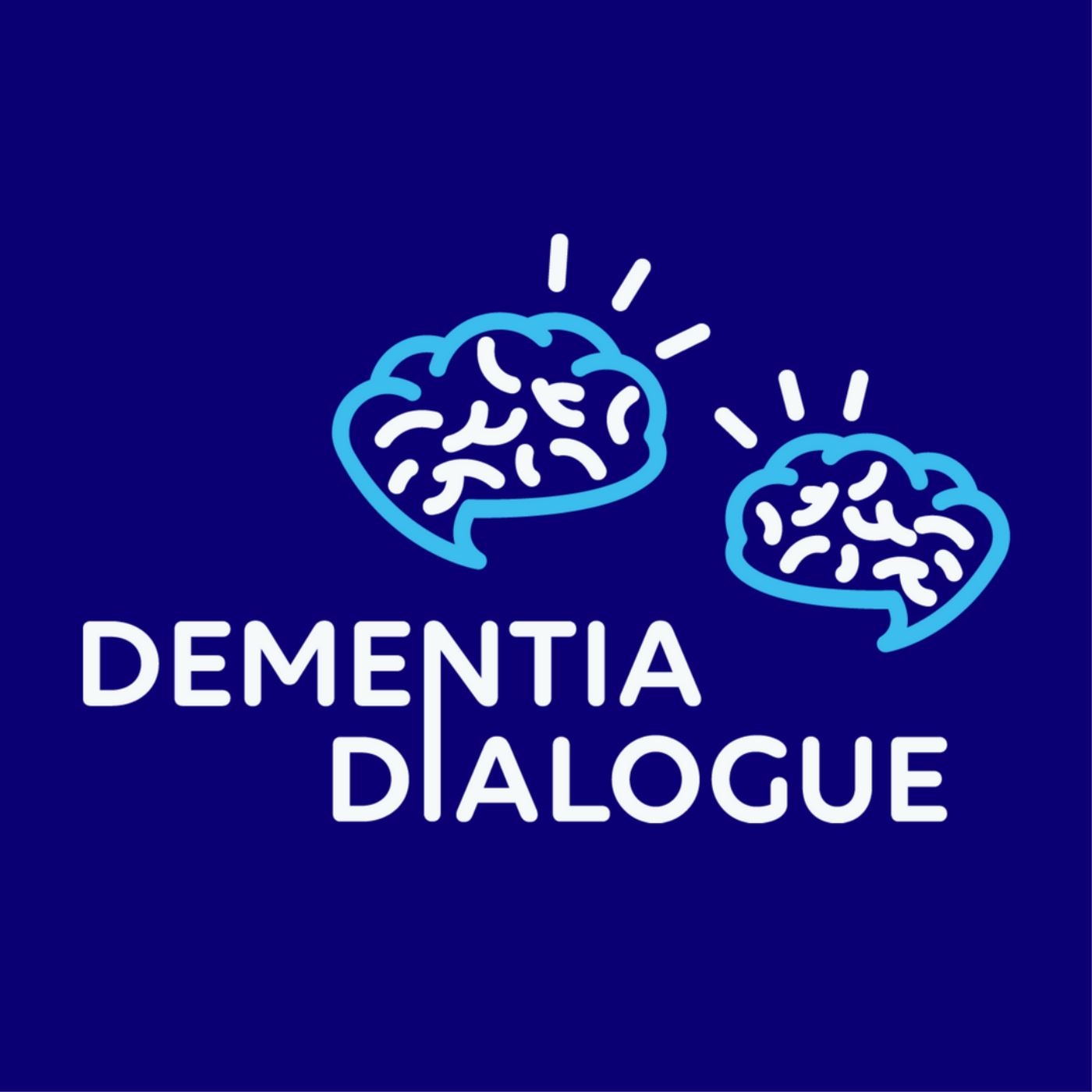
Check out www.dementiadialogue.ca Our podcasts feature people with dementia, their care/life partners, and supporters sharing experiences. They demonstrate their capacity to live fully and enable peer listeners to understand and gain insight and strengthen their adaptive skills. Episodes also enhance understanding within the broader community of what it means to live with dementia.
Check out www.dementiadialogue.ca Our podcasts feature people with dementia, their care/life partners, and supporters sharing experiences. They demonstrate their capacity to live fully and enable peer listeners to understand and gain insight and strengthen their adaptive skills. Episodes also enhance understanding within the broader community of what it means to live with dementia.
Episodes
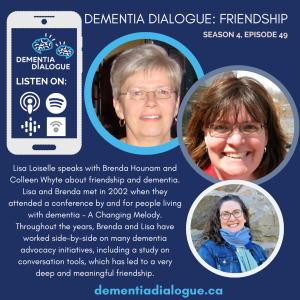
Tuesday Sep 06, 2022
Season 4: Episode 49- Friendship
Tuesday Sep 06, 2022
Tuesday Sep 06, 2022
Lisa Loiselle speaks with Brenda Hounam and Colleen Whyte about friendship and dementia. Brenda was diagnosed with early onset dementia at age 53. She met Lisa in 2002 when they, and others planned the first ever conference by and for people living with dementia – A Changing Melody.
Brenda and Lisa continue to work on many dementia advocacy initiatives and have formed a deep and meaningful relationship. The conversation includes the loss of friendships after a diagnosis, how participants in the study defined friends vs. acquaintances, leisure and how that helps people maintain friendships, how trust plays into relationships, and more.
Colleen Whyte is at Brock University. She and her colleagues, Darla Fortune (Concordia) and Rebecca Genoe (Regina) have studied friendship and dementia, published a number of articles, created a website and video vignettes. Brenda and Lisa have been working with them on a set of conversation tools.
Resources:
https://dementiaandfriendship.ca/
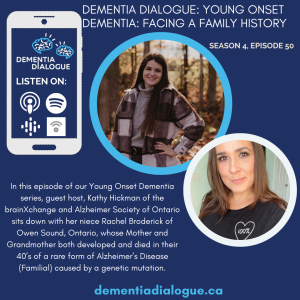
Wednesday Oct 05, 2022
Season 4: Episode 50- Rachel Broderick “Young Onset Dementia: Facing a Family History”
Wednesday Oct 05, 2022
Wednesday Oct 05, 2022
In this episode of our Young Onset Dementia series, guest host Kathy Hickman of the brainXchange and Alzheimer Society of Ontario sits down with her niece Rachel Broderick of Owen Sound, Ontario, whose Mother and Grandmother both developed and died in their 40s of a rare form of Alzheimer’s Disease. (Familial) caused by a genetic mutation. Rachel, along with her brother (both teens at the time), cared
for her Mom, Chantal, who was a single mother. The story of how she bravely faced this experience during her formative years and how it influenced the now 21-year-old woman she has become is truly inspiring. Rachel candidly shares with Kathy why she had made the difficult decision to have genetic testing done to find out whether she has the same genetic mutation and will develop Young Onset Dementia as her Mother and her Mother before she did.
Resources
- Genetic Testing and Alzheimer’s Disease - https://alzheimer.ca/en/about-dementia/what-alzheimers-disease/genetic-testing-alzheimers-disease
- A Few Facts about Genetic Testing and Young Onset Dementia - https://alzheimer.ca/en/about-dementia/other-types-dementia/young-onset-dementia/genetics
- What Teens Need to Know if a Parent has Young Onset Dementia -https://alzheimer.ca/en/about-dementia/other-types-dementia/young-onset-dementia/teens
- Young Caregivers Association - https://youngcaregivers.ca/about/
- Young Carers Project, Research Institute for Aging, University of Waterloo - https://the-ria.ca/resources/young-carers-project/
- Alzheimer Society of Canada, Young Onset Dementia - https://alzheimer.ca/en/about-dementia/other-types-dementia/young-onset-dementia
- brainXchange, Young Onset Dementia Resource Page - https://brainxchange.ca/Public/Resource-Centre-Topics-A-to-Z/Young-Onset-Dementia
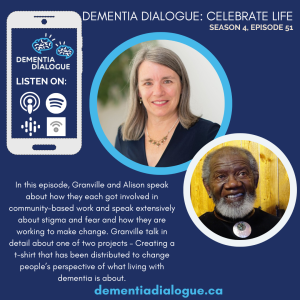
Tuesday Oct 18, 2022
Season 4- Episode 51: Celebrate Life
Tuesday Oct 18, 2022
Tuesday Oct 18, 2022
Although Granville Johnson is living with dementia, he remains part of the community. Granville is a website designer, an artist, a musician (jimbe), a teacher (school and music), and a community dignitary, and he performs and speaks at community events. After he was diagnosed with dementia, he continued his community work introduced by the BC Alzheimer society. He was introduced to the Dementia Action Group and has become an advocate for himself and others living with dementia (creating a toolkit and dementia celebrate life t-shirt). a program about reducing stigma. He is currently in a band called “The day will come project,” and they have written the lyrics and music for their debut album to be recorded in June 2022. The album is about his life living with dementia. He is also writing his autobiographical, fictional novel, with the first volume finished in June to coincide with the release of his album. Through his work as an advocate, he has found his community. He works towards educating the public about dementia but also supporting his peers.
Alison Phinney speaks about her work as a nurse and, over the years working with dementia and how that has led her to create a new community-based program called Building Capacity Project. This is a project that is a partnership between Vancouver and Thunder Bay. The purpose is to discover the assets that the community has and develop that would support people with dementia in a better way.
In episode 1, Granville and Alison speak about how they each got involved in community-based work and speak extensively about stigma and fear and how they are working to make a change. Granville talk in detail about one of two projects – Creating a t-shirt that has been distributed to change people’s perspective of what living with dementia is about.
In the second episode, Alison and Granville describe a Toolkit that came out of a collaboration between the community and people living with the experience of dementia and is meant to help others understand their experiences in the hopes that engagement and inclusion of those with dementia will become normalized.
Alison's Bio
Granville's Poem
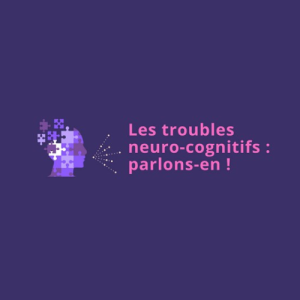
Tuesday Oct 25, 2022
Épisode 5 : Courage et espoir!
Tuesday Oct 25, 2022
Tuesday Oct 25, 2022
Après trois mois de relâche, nous sommes enchantés de vous revenir avec notre série de balado Les troubles neuro-cognitifs : parlons-en! Cet automne, nous vous-présenterons une série de balados mettant en vedette des francophones de l’Ouest canadien. Dans le premier épisode de la série, l’animatrice Ingrid Gagnon s’entretien avec Gioia Sallustio à propos de résilience, de la proche aidance, de l’importance d’avoir accès à des ressources dans sa langue maternelle et de son attachement pour la communauté franco-albertaine.
After three months off, we are delighted to be back with our podcast series Neuro-cognitive disorders: let's talk about it! This fall, we will present a series of podcasts featuring Francophones from Western Canada. In the first episode of the series, host Ingrid Gagnon talks with Gioia Sallustio about resilience, close support, the importance of having access to resources in your mother tongue and her attachment to Franco-Albertan community.
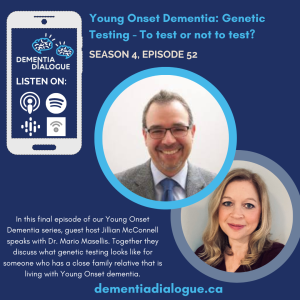
Tuesday Nov 08, 2022
Tuesday Nov 08, 2022
In this final episode of our Young Onset Dementia series, guest host Jillian McConnell speaks with Dr. Mario Masellis, Associate scientist and Clinician-scientist with the Hurvitz Brain Sciences Research Program, Sunnybrook Research Institute & Sunnybrook Health Sciences Centre; Assistant professor, neurology, department of medicine, University of Toronto and Research scientist, Centre for Addiction and Mental Health. Jillian and Dr. Masellis discuss what genetic testing looks like for someone who has a close family relative that is living with Young Onset dementia, how testing for Young onset dementia is different from other diseases, who is a good candidate for genetic testing, and the implications of deciding to test or decide not to test for Young Onset dementia.
Resources:
- Genetic Testing and Alzheimer’s Disease - https://alzheimer.ca/en/about-dementia/what-alzheimers-disease/genetic-testing-alzheimers-disease
- Alzheimer's genes: Are you at risk? - https://www.mayoclinic.org/diseases-conditions/alzheimers-disease/in-depth/alzheimers-genes/art-20046552
- A Few Facts about Genetic Testing and Young Onset Dementia - https://alzheimer.ca/en/about-dementia/other-types-dementia/young-onset-dementia/genetics
- Alzheimer Society of Canada, Young Onset Dementia - https://alzheimer.ca/en/about-dementia/other-types-dementia/young-onset-dementia
- brainXchange, Young Onset Dementia Resource Page - https://brainxchange.ca/Public/Resource-Centre-Topics-A-to-Z/Young-Onset-Dementia
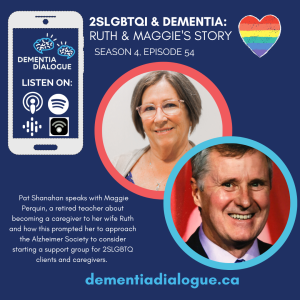
Tuesday Nov 29, 2022
Season 4- Episode 54: 2SLGBTQI & Dementia- Ruth & Maggie’s Story
Tuesday Nov 29, 2022
Tuesday Nov 29, 2022
In this episode, Pat Shanahan speaks with Maggie Perquin. Maggie retired early from teaching to become the carer for her wife Ruth who have been together for 27 years, married for 15 of those and between them they have 15 grandchildren. Ruth, also a retired teacher, had been struggling with cognitive issues for about 8 years when she was finally diagnosed with vascular dementia in 2018.
Following the diagnosis, Ruth and Maggie connected with the Alzheimer Society Southwestern Partners. While they were well received as a same-sex couple, they realized they were the only out participants in their group. Maggie approached the Alzheimer Society to consider starting a group to support 2SLGBTQ clients and caregivers. The first two sessions of the group had carers of 16 Alzheimer clients.
Maggie has invited any listeners who might be interested in contacting her by email at l nanastable675@gmail.com
Resources:
Ruth and Maggie share their story in this video.
Dementia as an Animal
https://www.youtube.com/watch?v=ynAXxAO4pws
Alzheimer Society Southwest Partners
Ontario Alzheimer Society
National Institute on Aging /Egale Canada
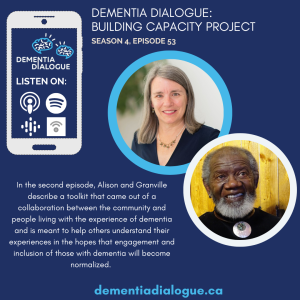
Monday Dec 12, 2022
Season 4, Episode 53: Building Capacity Project
Monday Dec 12, 2022
Monday Dec 12, 2022
This is the second episode about the Building Capacity Project (Part 1 is episode #51), a joint initiative of UBC and Lakehead University. Alison Phinney and Granville Johnson focus on a Toolkit the project has
developed to promote the inclusion of people with dementia in community programs. It is meant to help community leaders and program participants to understand how dementia is experienced and, thus, normalize how they can be included in mainstream opportunities.
Link to the toolkit: https://www.flippingstigma.com/

Tuesday Jan 10, 2023
Saison 2 Episode 1 L’approche par le plaisir©
Tuesday Jan 10, 2023
Tuesday Jan 10, 2023
Nos invitées pour ce balado sont Hélène Carbonneau, professeure au Département d’études en loisir, culture et tourisme à l’Université du Québec à Trois-Rivières et Sandra Harrisson, professeure agrégée à l’École des sciences infirmières de la Faculté des sciences de la santé de l’Université d’Ottawa.
Hélène et Sandra collaborent depuis plusieurs années maintenant à l’élaboration d’un cadre plus humain pour les services et les soins des personnes atteintes de troubles de mémoire. Ce cadre, qu’elles appellent l’approche par le plaisir©, optimise la qualité de vie des clients en misant sur leur bien-être psychologique. Dans cet entretien, Hélène et Sandra nous parlent de cette nouvelle approche et de ses impacts positifs sur les clients, les familles, les proches aidants et le personnel soignant. Pour plus d’information sur cette approche, vous pouvez communiquer directement avec Hélène et Sandra.
Si vous êtes un proche aidant ou un organisme communautaire, veuillez contacter Hélène par courriel à : Helene.Carbonneau@uqtr.ca
Si vous êtes un organisme du réseau de la santé, veuillez contacter Sandra par courriel à : SHARRISS@uottawa.ca
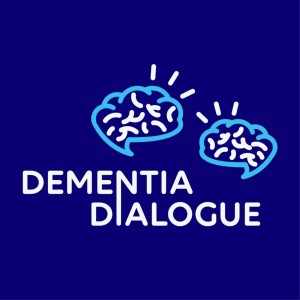
Tuesday Jan 17, 2023
Season 5: Episode 1: Offering certainty – Biomarkers, diagnosis and dementia
Tuesday Jan 17, 2023
Tuesday Jan 17, 2023
Dr. Mari DeMarco, Ph.D., is a researcher at the University of British Columbia concerned with how the diagnoses of neurodegenerative diseases can be improved by discovering and using biomarkers. Led a study on biomarkers. Her lab aims to create better tools for the timely diagnosis of Alzheimer's disease, frontotemporal degeneration, and related disorders and make these tools easily accessible to those that need them.
Dr. DeMarco talks about the use of the amyloid beta peptide and tau biomarkers in dementia and specifically Alzheimer's Disease and the results of the one arm of the Impact-AD study on clinical management. These two biomarkers are found in cerebral spinal fluid. They offer patients and healthcare providers a definitive diagnosis of Alzheimer's Disease, something that previously eluded many individuals.
The analysis offered by Dr. DeMarco's lab at St. Paul's Hospital in Vancouver is available in Canada to consulting physicians, i.e., neurologists, geriatricians, and psychiatrists, who think that a patient who has symptoms of dementia would benefit from the test. It is not a screening test for people without symptoms.
Additional Information:
Information about the study can be found: at https://www.impactad.org/resources.
A presentation by Dr. Demarco on what a biomarker is at https://www.impactad.org/post/2020-alzheimer-update.
For additional resources, please visit the Resource page on the Dementia Dialogue website (https://www.dementiadialogue.ca/resources-1) and choose Biomarkers from the left navigation panel.
Roche Canada sponsors this episode.

Tuesday Jan 31, 2023
Season 5: Episode 2- Seeking Clarity – Biomarkers, Diagnosis and Dementia
Tuesday Jan 31, 2023
Tuesday Jan 31, 2023
In this second episode on biomarkers, Ann Bil, a woman living with dementia, and Kristi Wijnsma, her daughter, discuss why they enrolled in the IMPACT-AD, their experience, and how they used the results from the investigation. Khushbu Patel, a research associate of Dr. Mari DeMarco, the principal investigator, talks about some other participants' experiences and resources available at www.impactad.org/resources.Kristi mentions the help provided through First Link, a service of the Alzheimer Society of British Columbia and other Alzheimer Societies in Canada.
The analysis offered by Dr. DeMarco’s lab at St.Paul’s Hospital in Vancouver is available in Canada to consulting physicians, e.g., neurologists, geriatricians, and psychiatrists, who have patients with symptoms of dementia and may benefit from the test. It is not a screening test for people without symptoms.
A presentation by Dr. Demarco on what a biomarker is at https://www.impactad.org/post/2020-alzheimer-update.
For additional resources, please visit the Resource page on the Dementia Dialogue website (https://www.dementiadialogue.ca/resources-1) and choose Biomarkers from the left navigation panel.
This episode is sponsored by Roche Canada.

